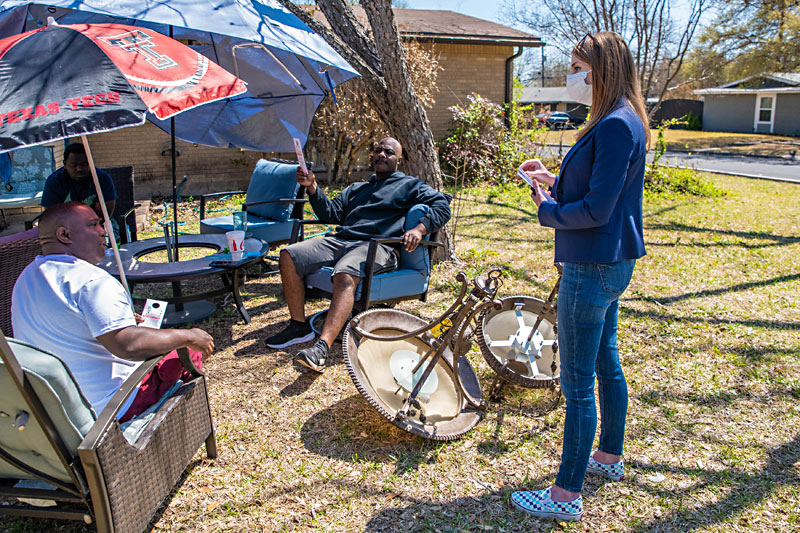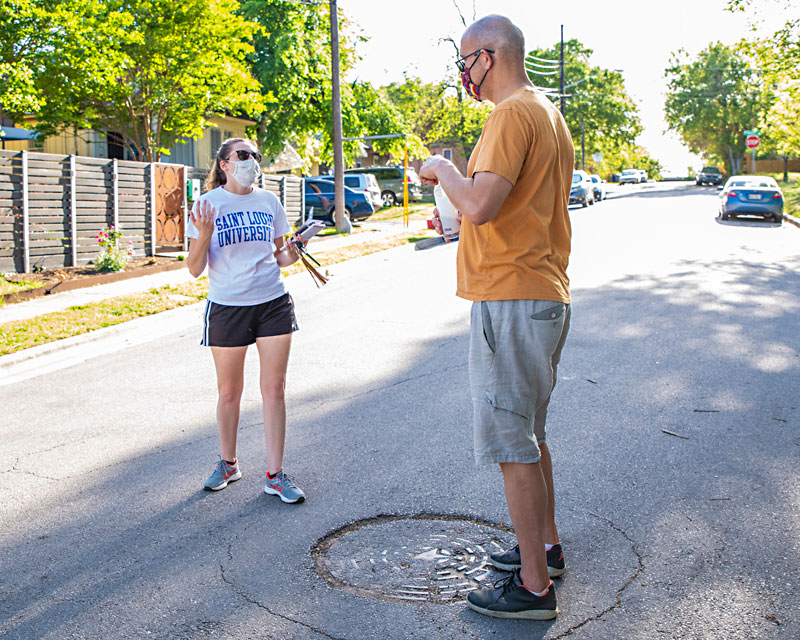Meaner Streets?
Proposition B: The high-dollar pushback on Austin’s homeless policies
By Benton Graham, Fri., April 16, 2021

In June 2019, after many years of pressure from justice advocates, Austin's increasingly left-leaning City Council voted to roll back the city's 20-year-old ordinances that banned camping, sitting or lying down, and panhandling in many public spaces. These moves to decriminalize the experience of homelessness, and to acknowledge that the growing presence and needs of Austin's unsheltered poor could not solely be handled by law enforcement, set City Hall on a new strategy, but drew swift pushback from Downtown stakeholders, Austin conservatives, and high-profile Texas Republicans, including Downtown Austin resident Gov. Greg Abbott.
This election's Proposition B represents the culmination of that backlash; the ordinance, if approved by voters, would reinstate the "camping ban" and prohibit panhandling at certain hours. Save Austin Now, a group founded by Travis County Republican Party Chair Matt Mackowiak and Democratic activist Cleo Petricek, has spearheaded the effort, beginning its petition drive in February 2020, right before the COVID-19 pandemic scrambled both Austin's homelessness strategies and the group's campaign tactics.
After resorting to an untried strategy of mailing its petitions to every Austin registered voter, SAN submitted its initiative for the November 2020 ballot, but was rejected by City Clerk Jannette Goodall, who determined through statistical sampling that the group hadn't collected the 20,000 names it needed. While SAN filed suit to challenge Goodall's ruling, it also continued to collect signatures and tried again, easily meeting the ballot threshold for the May 1 election.
Both sides say they want the best solutions to meet the needs of Austin's unhoused, but the agreement ends there. Prop B's opponents, led by the Homes Not Handcuffs coalition that successfully advocated for the June 2019 Council vote, point out that ending the camping ban was not intended as a housing strategy. "The effort was intended to right a wrong, which was the criminalization of people for the status of being homeless," Homes Not Handcuffs' Chris Harris said. He and other advocates feel that now, with the magnitude of Austin's housing crisis more visible to everyone, the underlying issues are being discussed more honestly. "We understand why people don't like it, and don't want to see it," he said. "The question is what is the best way, the most humane way, and the most effective way to solve it."

Central Texas Interfaith has also come out against the proposition. Reverend John Elford, senior pastor at University United Methodist Church and a CTI leader, says that many Austinites experiencing homelessness now have expressed fear about the ordinance being reinstated. "My biggest concern is that you're asking people to leave places, and you don't have a place for them to go," Elford said. "And you're putting them in harm's way, because they're going to end up just having to move from place to place."
SAN, whose board also includes leadership from the UT campus advocacy group SafeHorns and the Austin Police Assocation, says that the lack of consequences for public camping and panhandling has made the city less safe while also hobbling its housing strategies. "The 2019 policy changes have left an unmistakable incentive for homeless individuals to leave their shelters and live on the streets and parks of Austin," Petricek said during the Chronicle's Virtual Election Forum, pointing to decreasing shelter censuses and increases in the unsheltered population as captured in the 2020 Point-in-Time Count (the 2021 count was not conducted in January due to the pandemic.)
For a measure that only proposes limited changes to local ordinances that are typically enforced with citations, a lot of money is being spent to pass Prop B. SAN's most recent campaign finance filings report more than $435,000 in contributions from more than 2,000 donors. While Homes Not Handcuffs enjoys the support of many prominent city leaders and institutions, it only reported $23,000 on its latest filing, though both sides are of course still raising money.
"Our incredibly strong finance report sends a very clear message: This city is ready to finally and fully end the public camping disaster which has been bad for both the residents and the homeless, causing real harm to public safety, public health, tourism and the image of Austin," Mackowiak said in a press release last week. A significant chunk of SAN's spending ($240,000 out of nearly $320,000 on its 30-day-out report) has gone to Victory Solutions, an Ohio-based GOP consulting firm, for "advertising expenses" and "voter identification efforts." The Trump presidential campaign helped keep the firm afloat during the 2016 election with a $1.2 million check (Victory Solutions was in debt to the IRS at the time). Shannon Burns, its chief executive, went on to serve as an advance associate in the Trump White House.
Opponents have identified what they think could be questionable electioneering efforts by, or at least in behalf of, Save Austin Now. Independent research shared with the Chronicle includes evidence that automated "bot" accounts could be churning out pro-Prop B messaging on Twitter. The source who conducted the research, who requested anonymity to avoid being a target of a bot network, looked at responses to six high-engagement tweets from three prominent anti-Prop B figures: Mayor Steve Adler, Council Member Greg Casar, and Harris.
Averaged scoring from the independent bot-ID sites Botometer and Bot Sentinel found that more than 40 accounts had at least a 20% likelihood of being a bot. Multiple accounts popped up at key inflection points in the debate, including last year when the initiative did not make it onto the ballot, as well as recently. Experts say that the findings are highly suspicious but almost impossible to definitively prove. "In this case, I don't think there's any way to reveal the true identity of potential voters," JungHwan Yang, a professor at the University of Illinois Urbana-Champaign, said. "I think the best way to say it is that it's suspicious, but there could be some possibility of this being a real grassroots campaign."
When asked for comment, SAN's Mackowiak responded with a low-resolution photo of a computer screen displaying a different bot-ID site's verdict that many of the Chronicle's Twitter followers are fake. He did not elaborate.
Got something to say on the subject? Send a letter to the editor.








